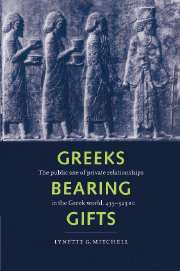Book contents
- Frontmatter
- Contents
- Preface
- Abbreviations
- 1 Philia
- 2 Philia and the polis
- 3 Philia and political activity
- 4 Magisterial appointments: Sparta
- 5 Magisterial appointments: Athens
- 6 Persia and the Greeks
- 7 Athenians and Thracians
- 8 Philip and the Greeks
- 9 Alexander
- 10 Friendship and ideology
- Appendix I Magistrates with connections
- Appendix II Notes on magistrates for the years 435–323 BC
- Bibliography
- Indexes
10 - Friendship and ideology
Published online by Cambridge University Press: 06 July 2010
- Frontmatter
- Contents
- Preface
- Abbreviations
- 1 Philia
- 2 Philia and the polis
- 3 Philia and political activity
- 4 Magisterial appointments: Sparta
- 5 Magisterial appointments: Athens
- 6 Persia and the Greeks
- 7 Athenians and Thracians
- 8 Philip and the Greeks
- 9 Alexander
- 10 Friendship and ideology
- Appendix I Magistrates with connections
- Appendix II Notes on magistrates for the years 435–323 BC
- Bibliography
- Indexes
Summary
I hate the idea of causes, and if I had to choose between betraying my country and betraying my friend, I hope I should have the guts to betray my country.
E. M. Forster, Two Cheers for DemocracyThe values and principles of any given society as we are all aware (in the sense that we are all ‘specialists’ at living within our own society) are both multifarious and mutable. And yet in open contradiction to this we often make generalisations about our own society and the societies of others, simplifying complex behaviours into basic and sometimes apparently simplistic principles in order to try to understand and interpret them.
This book has been about friendship, philia, and interstate relations. It has been suggested that the models of friendship in classical Greece were based at least in part upon patterns of exchange which were themselves governed by the status of individuals as ‘insiders’ or ‘outsiders’, friends or enemies, creating expectations of the way relationships should work. Furthermore, it has also been suggested that this was true both for personal and inter-polis relations, and that in fact the models for one sphere were copied and adapted for the other.
Many of the types of exchange-relationships current in the classical period grew out of and were inextricably linked with the relationships of an older age, and were modernised by the polis into forms which could be used for and by the polis.
- Type
- Chapter
- Information
- Greeks Bearing GiftsThe Public Use of Private Relationships in the Greek World, 435–323 BC, pp. 178 - 191Publisher: Cambridge University PressPrint publication year: 1998



